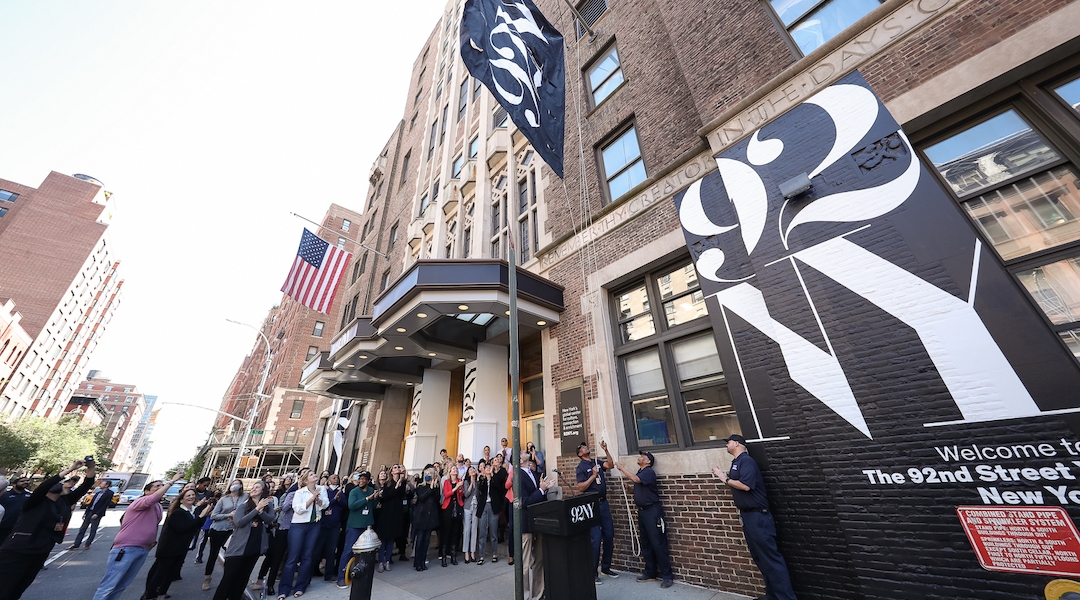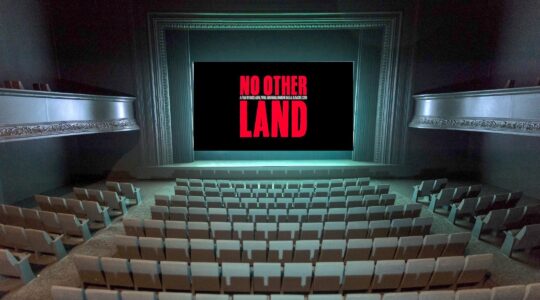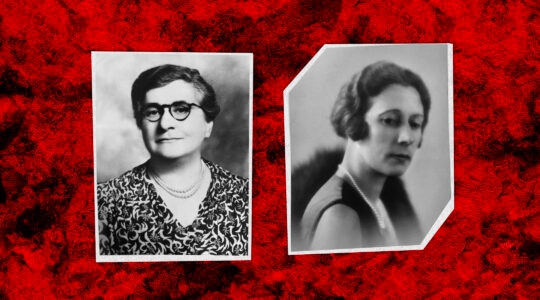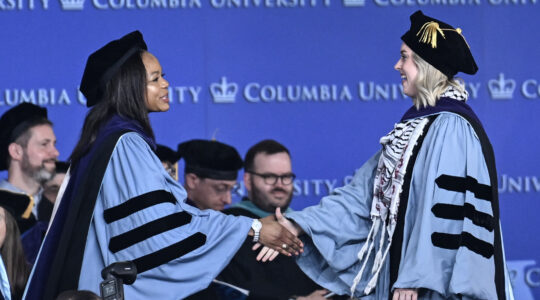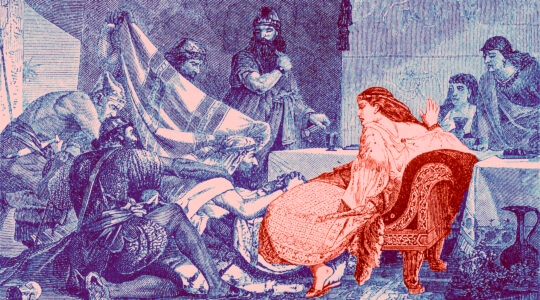(JTA) — When I last spoke to Seth Pinsky in January 2020, soon after he was appointed CEO of the 92nd Street Y, he was looking forward to the challenge of taking over at a legacy New York Jewish institution — unaware that a pandemic was about to sweep away nearly all of the assumptions he brought to the new job.
Like every business and nonprofit, the 92nd Street Y, one of New York City’s cultural landmarks, was staggered by the shutdowns brought on by COVID. Live events ground to a halt and the center had to lay off staff.
Now, as New York’s cultural life emerges from over two years of upheaval, the Y is embarking on a $200 million renovation of its home on the Upper East Side. It’s also investing some $30 million in a digital platform — called The Roundtable — that will turn the expediency of online programming into an established part of its offerings.
What the Y is calling a “transformation” will also include new branding: An institution founded in 1874 as the Young Men’s Hebrew Association and that became known as the “The 92nd Street Y” is becoming “The 92nd Street Y, New York” — a city-centric identity reflected in a new logo reading “92NY.”
Although its “pillars” include the Bronfman Center for Jewish Life, with Jewish study for adults, an after-school program for kids and a leadership fellowship for rabbinical students, the “Y” was never just a Jewish community center. It competes with the city’s major secular venues by presenting classical music, modern dance, the American songbook and speakers and programs far afield from Jewish life — to the degree that, in 2014, when it appointed a new executive director who wasn’t Jewish (Henry Timms, Pinsky’s predecessor), some worried it had lost its way as a Jewish institution. Rabbi Peter Rubinstein of Manhattan’s Central Synagogue, hired that same year as the Y’s director of Jewish community, helped assuage critics by expanding its Jewish programming and adding the prominent Brooklyn rabbi Andy Bachman to his team.
On Thursday I spoke via Zoom about 92NY’s new look and its Jewish future with Pinsky — who came to the Y after heading economic development for the Bloomberg administration — and Rabbi Joui Hessel, the interim director of the Bronfman Center for Jewish Life. (Rubinstein is now its emeritus director.)
Our conversation was edited for length and clarity.
New York Jewish Week: How much did the pandemic impact you financially and how much does that play into the current rebranding and redevelopment?
Seth Pinsky: The pandemic was incredibly painful for us as an institution. Everyone who worked at the 92nd Street Y was impacted. And then on top of that, we saw attendance in our in-person events fall to zero, and it had a significant financial impact. We had to do what many of our peer institutions did in terms of furloughs and layoffs, which were maybe the most difficult decisions that we had to make.
Never miss a story. Sign up for JTA's Daily Briefing.
SUBSCRIBE HEREBut what was interesting for us was that at a certain moment, we made the decision that we were going to have to view the challenges that we’re facing also as opportunities. The pandemic was forcing us to reimagine everything about who we were and to ask the question looking at a 150-year-old institution and say what we want to be going forward.
And that was?
Pinsky: One of the things that we learned during the pandemic was, as we transitioned our program from in-person to online, is that we had a global audience, and that our messaging, our values, the things that we’ve always viewed to be important, resonated all across the United States and then over 200 countries. Pre-pandemic, we would have, on average, about 300,000 people come through our doors for all of our programming. For the last couple of years, our online programming alone, we’ve created about 2,000 original programs that have generated about 6 million views. And so, coming out of this, we decided that we were going to work to continue to hold true to the values and mission that have always animated the 92nd Street Y, but in a distinctly 21st-century manner.
And part of that is what you described as “doubling down on the deep connection with your home city.” In rebranding as “The 92nd Street Y, New York,” why is that important?
Pinsky: As we expanded internationally, we came into contact with lots of people who had never heard of the 92nd Street Y and we had to figure out a way quickly to communicate something important about ourselves. We are the kind of place that couldn’t exist anywhere other than New York.
We also found that connecting ourselves to New York helped to elevate our brand. It’s kind of like fashion houses that put the word “Paris” in their name. If you’re a cultural institution and you have the word New York in your name, it adds a certain cachet. It is a subtle enough change that it didn’t fundamentally alter our underlying identity.
The Roundtable is the new online platform. Does that suggest that streaming events are here to stay, and a new revenue stream?
Pinsky: They’re definitely here to stay and they’re unquestionably a net positive for us. They’ve allowed us to expand our community exponentially. What we’re fundamentally about is enriching lives and connecting people. And being online allows us to do that at an even greater scale than we could when we were solely in person. That doesn’t mean that we’ve abandoned in-person programming, but it’s a great addition to our repertory.
One of the challenges that we faced pre-COVID was that we were essentially maxed out in terms of the scale of programming that we were producing, because our space was being used almost 24 hours a day, seven days a week. Digital programming allows us to add to our programming without taxing our physical space.
I’d like to ask about the Y’s Jewish past and future. In what ways is it a Jewish institution and how is that part of the transformation?
Joui Hessel: We were created by Jewish people who came to New York and wanted a place for the community and specifically for those newer immigrants coming from other countries who really didn’t have the connections to community or family that other people were lucky to have. We were founded on this idea of creating space to build community — some might say a sacred space to build community where people could learn, explore their Jewish identity, learn about American culture and arts, especially as new immigrants. And we continue to maintain that as part of our mission today and we’ll be doing so in the future.
Obviously the Jewish community in America has changed quite a bit over the past 100-and-change years, and it will continue to do so. We remain at the forefront of trends, whether it’s The Roundtable or utilizing other platforms for learning and teaching or simply understanding where the Jewish people are. In terms of the unaffiliated and unengaged, we are trying to welcome them and try to find points of entry into Judaism so that they can attach themselves and explore their own identity on their own terms and feel affirmed in doing so.
Pinsky: We’ve always been a Jewish organization and Jewish programming has always been an important part of what we do. But when I came to the 92nd Street Y, I asked Rabbi Rubinstein, “In a city like New York, with so many Jewish institutions, do we need the 92nd Street Y to be Jewish? Why is that so important for us?” That started essentially a two-year conversation. And some of the things that Rabbi Hessel was referring to have come out of that conversation. The 92nd Street Y has always occupied a very interesting niche in the Jewish community. We kind of straddle the line between religion and culture. We’re a place that has always been very welcoming of people who defined their Jewishness in lots of different ways. And that if you look at the 21st-century Jewish community, the greatest challenge and the greatest opportunity that we face is that the community is changing.
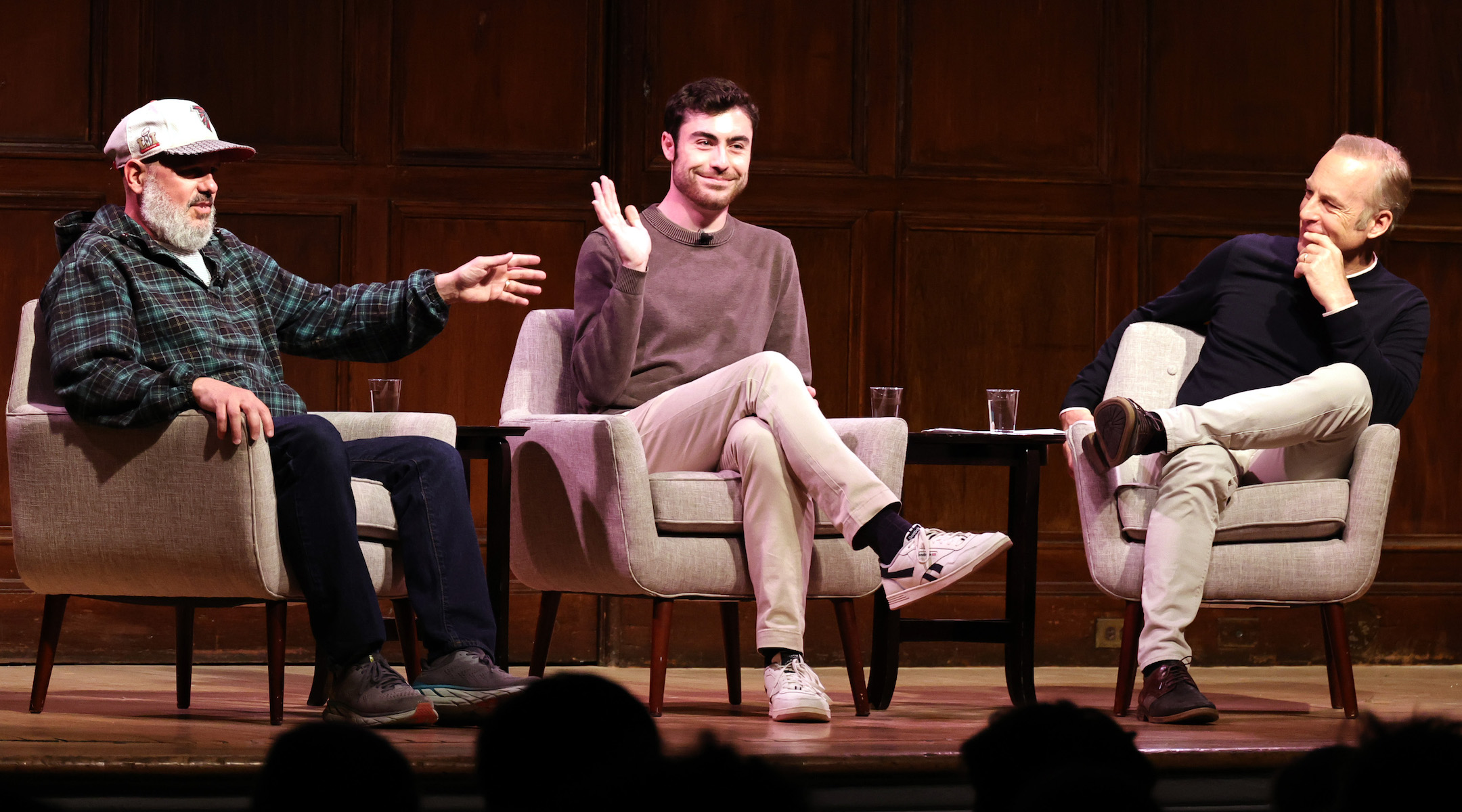
Comedian David Cross and actors Nate Odenkirk and Bob Odenkirk discuss the Audible podcast “Summer In Argyle” at The 92nd Street Y in Manhattan, May 11, 2022. (Theo Wargo/Getty Images)
In what ways?
Pinsky: You have a growing number, especially of young people, who for one reason or another are not connected to traditional Jewish institutions. And our belief is that we’re uniquely positioned to serve as an entry point to that community. And so in addition to focusing on the community that we’ve always served, we are going to be particularly focusing on that part of the community. And the idea there is either we become the Jewish home to many people who meet those criteria, or serve as a bridge between us and then other institutions, whether they be synagogues or other ones.
Hessel: I think that is one of the strengths of being 92NY. We actually consider it a win if someone comes to us to explore their Jewish identity, feels affirmed and confident and authentic in their Judaism and then asks us to introduce them to a variety of rabbis and congregations and other institutions to which they would like to belong.
Seth was referring to a recent initiative that I luckily inherited upon my arrival. The Home Project is an initiative focusing on unaffiliated Jews who typically for a variety of reasons haven’t been found in mainstream formal Jewish institutions. So we have looked at different cohorts of Jews — Jews of color, interfaith families, LGBTQ, plus first-generation Americans — all these different pockets of Jews. And we have worked with partnering agencies to figure out ways to engage and bring families together and to help build community with and for them in whatever way they feel they would like.
Pinsky: A couple of months ago, we began a major fundraising drive to make sure that we had the resources available specifically for the Bronfman Center. We set an original fundraising goal of $10 million, and we’ve now raised the goal to $18 million. [Canadian investor] Matthew Bronfman has made a lead pledge. Jonathan Tisch and Lizzie Tisch [of the Loews Corporation] have made a significant gift. We’re calling it the Rabbi Peter Rubinstein Fund for the Jewish Future and it’s going to allow us to really supercharge the programming that Joui is talking about.
Younger Jews also aren’t as connected to Israel as previous generations, and many are vocal either in criticizing Israel or saying they don’t relate to the idea of a Jewish state. Has that come up in either the kinds of speakers you plan on booking or in some of the discussions you’re having in classes and other programming?
Pinsky: As an institution, we’ve always been strong believers in the importance of the State of Israel and the existence of the State of Israel. We also know that there are a lot of areas that need to be discussed vis a vis Israel and there are lots of different perspectives. Much of our programming touches on Israel in one way or another, whether it’s discussing relevant, current topics about Israel, or exploring elements of Israeli culture. It’s bringing Israeli artists to our stages. Going forward we certainly believe that it’s important for us to continue to engage on the topic of Israel, to have respectful conversations about it, and to continue to show, in spite of questions that we might have about one policy or another, our support for the country.
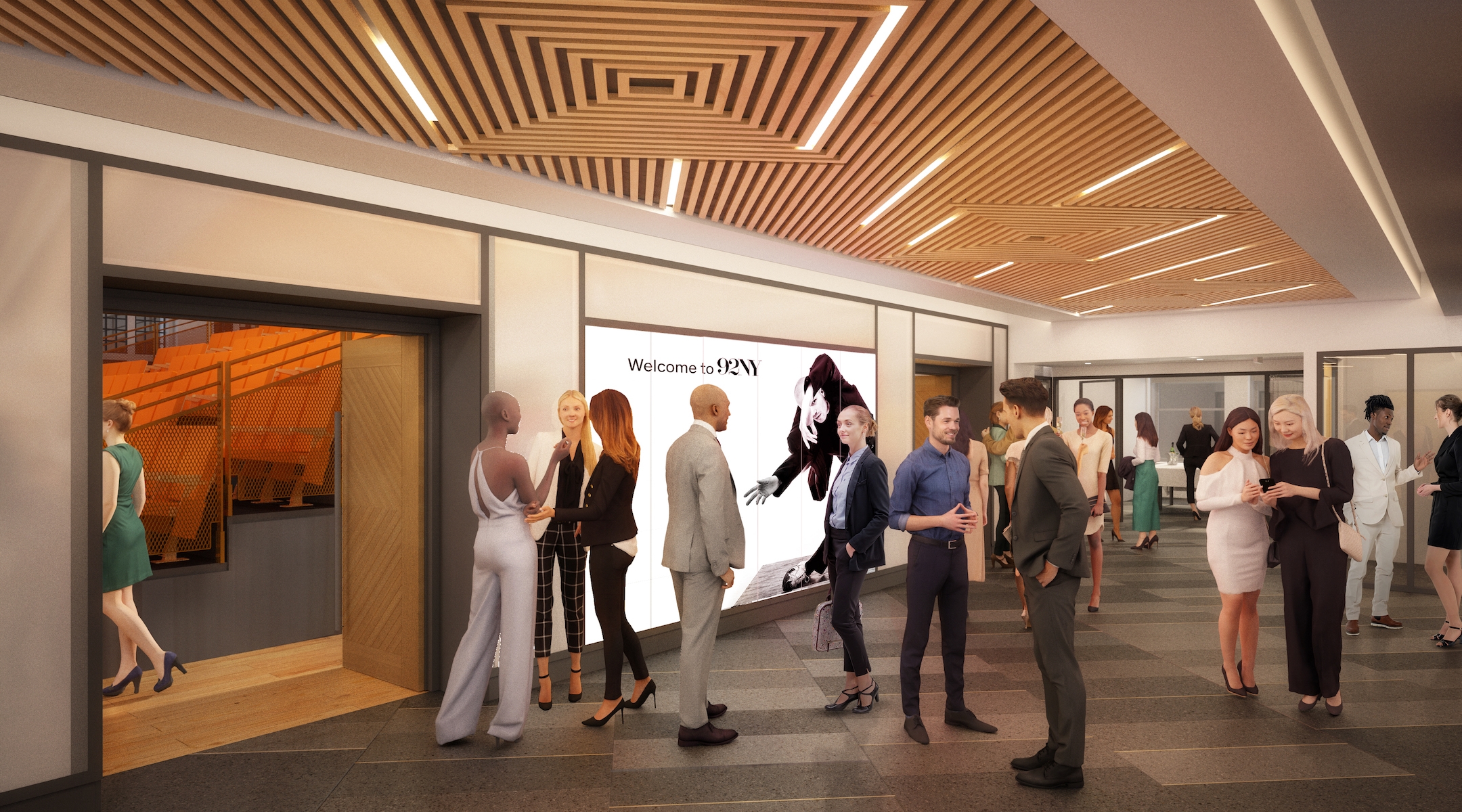
An architect’s rendering of the lobby of The 92nd Street Y as it will look after a $200 million campus master redevelopment plan. (Beyer Blinder Belle Architects & Planners LLP)
Hessel: I would just add that everyone has a seat at the table. Jewish tradition encourages us to debate and to study in chevruta (partnership). And so we take that model for everything we do. I remember talking to Seth a few months ago, and saying, “One of these discussion groups on Israel could get pretty loud. Are you ready for that?” He said, “Absolutely.” I think people learn the most when they’re uncomfortable, and the topic of Israel is one that is very sensitive and emotionally driven for some people and I look forward to hearing those discussions, as long as it is done in a civil and respectful way. We are uniquely poised to serve as a neutral ground to host those kinds of conversations.
I’m thinking of another New York institution, the Jewish Museum, that over the years will put on an exhibit and people will ask, “What’s Jewish about that?” So I wonder if even in the secular programming at the Y — the nightly conversations with artists and writers and authors, or the classical music — is there a certain conception of Jewishness that animates that part of the institution?
Pinsky: Almost everything that we do is at a certain level Jewish because it’s animated by our Jewish values. And those Jewish values include an understanding of the importance of belief in education, a belief in discussion and debate, civil discourse, a belief that the world can be improved and that it’s our job to try to do that. One way or another, just as we’re an institution that could only exist in a city like New York, we’re also an institution that could only have been founded by a people like the Jewish people.
JTA has documented Jewish history in real-time for over a century. Keep our journalism strong by joining us in supporting independent, award-winning reporting.

